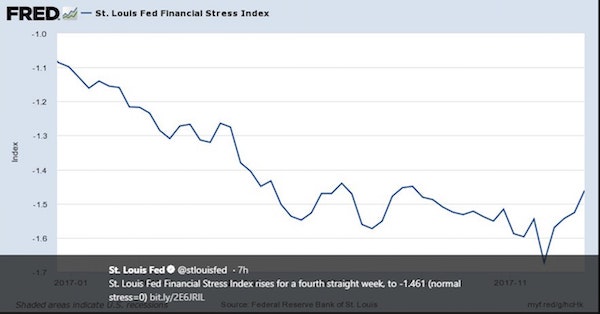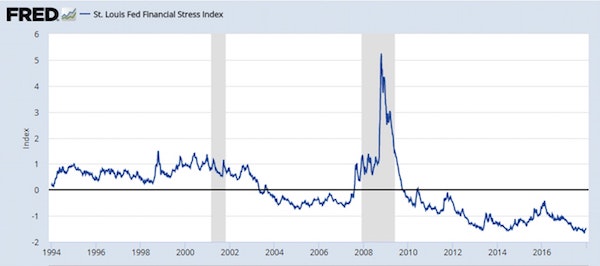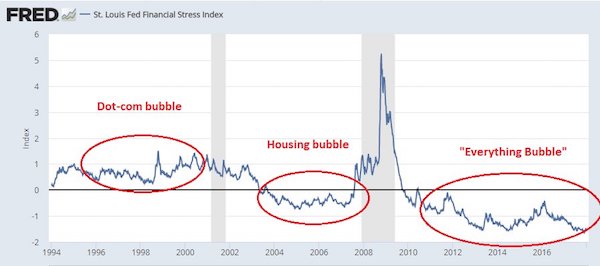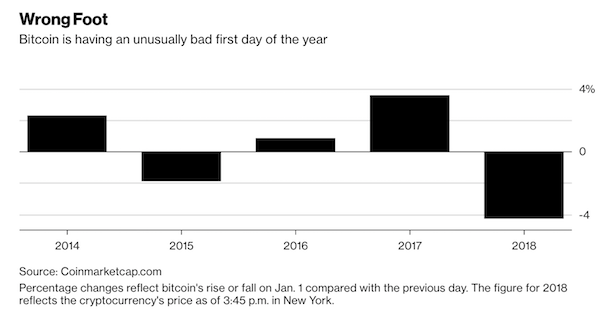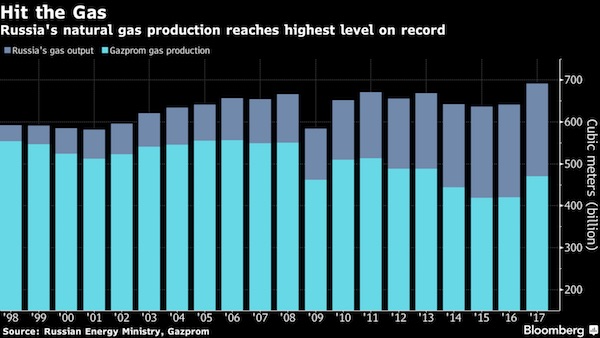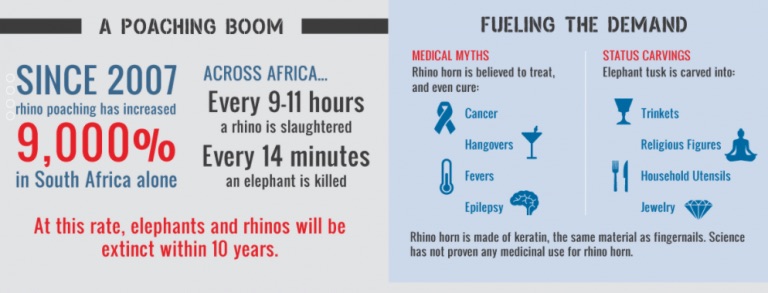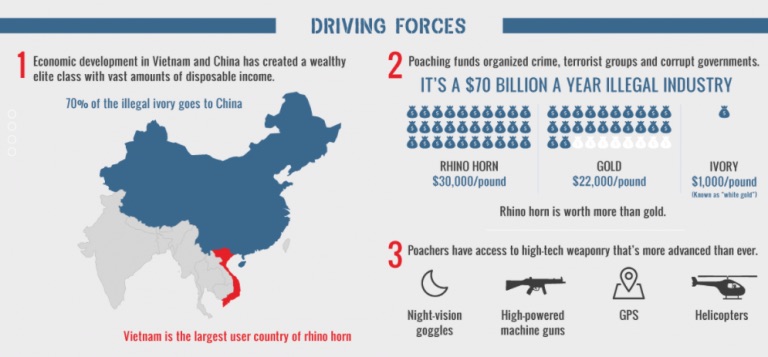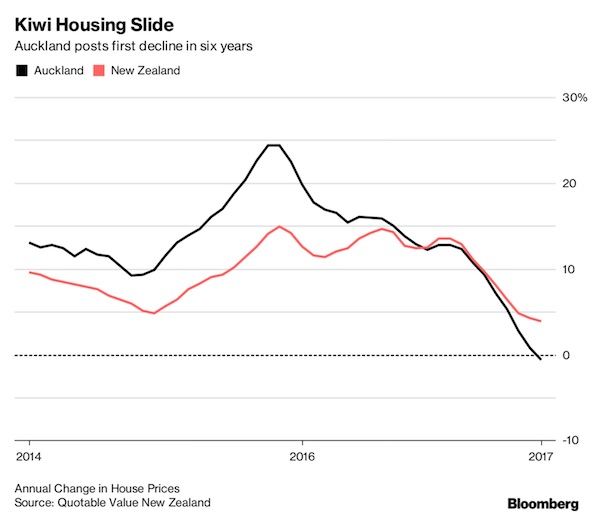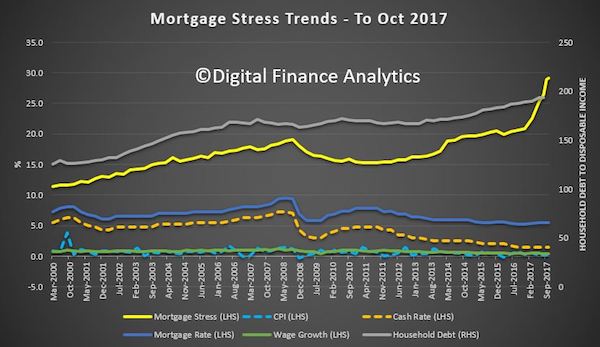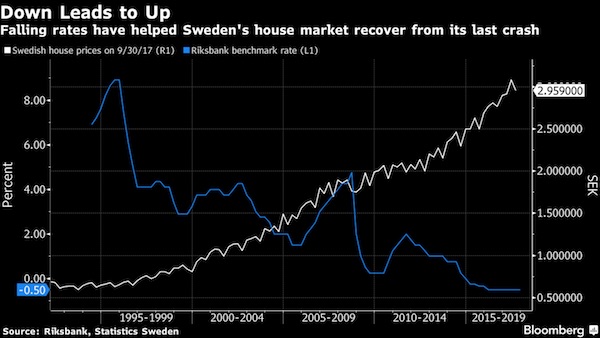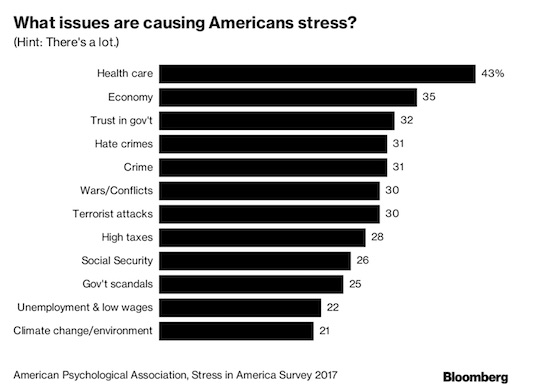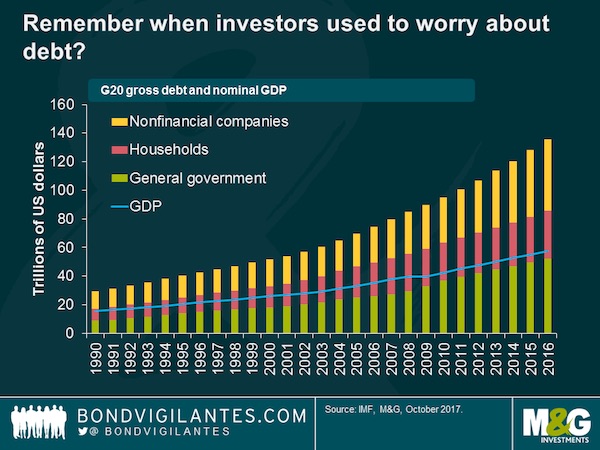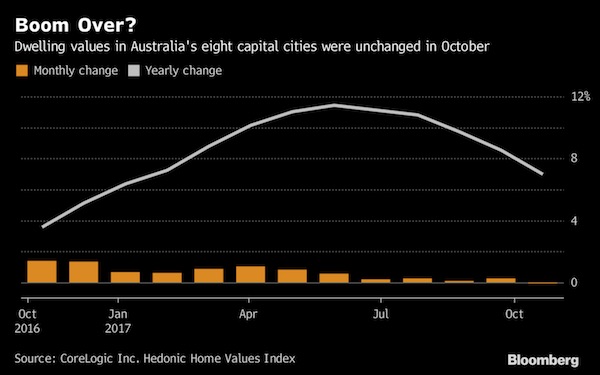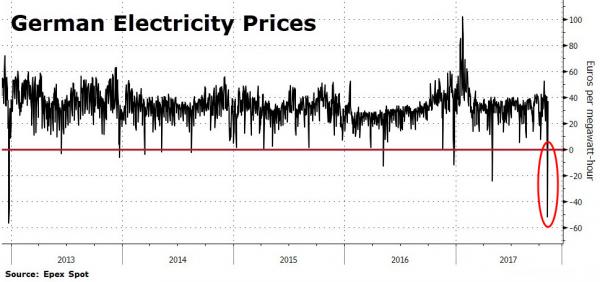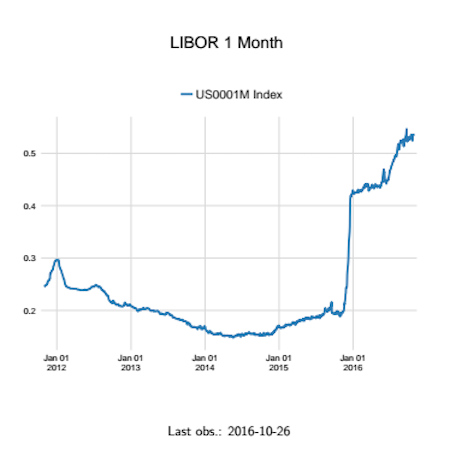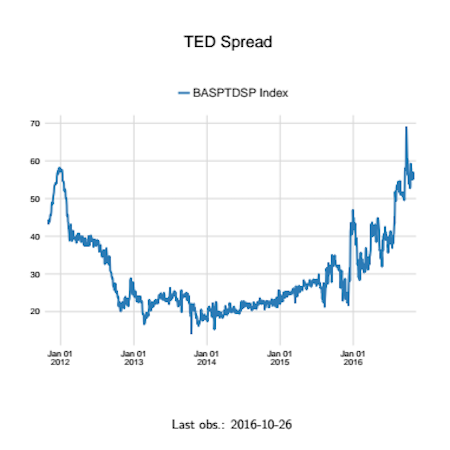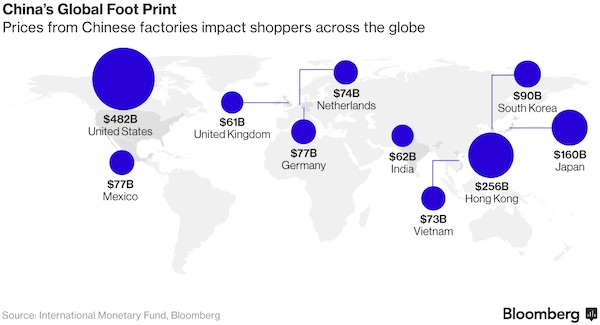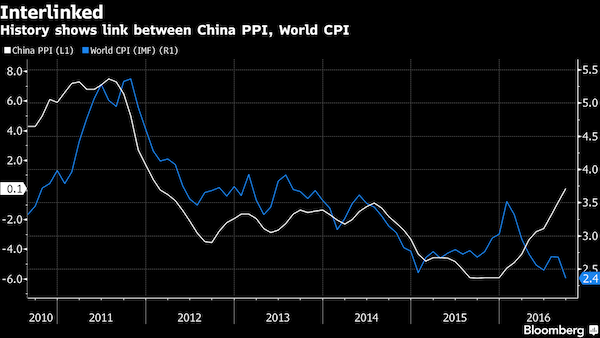
Gilles Mostaert Sodom and Gomorrah 1597

Weak dollars make weak economies. Or is it the other way around?
• Kudlow: Trump Needs A Return To ‘King Dollar’ (CNBC)
The Trump Administration and the Republicans in Congress have passed one of the best pro-growth tax bills ever. The Tax Cuts and Jobs Act ranks in the all-time hall of fame of legislation, along with Ronald Reagan’s 1981 and 1986 Tax Acts and John F. Kennedy’s posthumous tax cuts of 1964. The announcements by Apple, FedEx, ATT, Fiat Chrysler and over 300 companies with multi-billion dollar investments in the U.S. are early indicators of good things to come from the tax rate cuts. When this is combined with President Donald Trump’s deregulation agenda, we see no reason why the economy cannot grow for a sustained period at 3 to 4% growth — up from 1.6% in Obama’s last year. But there is still a missing pillar of prosperity in the Trump economic agenda, and that is a sound dollar strategy.
The dollar weakened in 2017 and we want it stabilized. There’s little in this world that can bring our economy to its knees faster than a weak dollar in the foreign exchange markets. Just ask people who served in the administrations of Nixon, Ford, Carter, Bush 2 and Barack Obama’s first term. All of them were undone by a weak and depreciating dollar, surging inflation, spiking interest rates, plus financial or commodity bubbles. Meanwhile, under Reagan the U.S. dollar increased by 67% in value on foreign exchange markets through 1985. The price of gold, interest rates, and inflation all fell as well from double-digit inflationary highs, while the American economy reignited and the stock market launched its 18 year bull market.
Or, go back further in time. In May of 1962, President Kennedy’s Revenue Act was passed and he reaffirmed that the U.S. dollar was as good as gold — thus launching the incredible boom called the ‘Go-Go Sixties’. A strong dollar is an essential pillar of economic prosperity with minimal inflation, but we worry that the White House has not adopted this strategy. So we urge the Trump administration to return to the successful “King Dollar” policies that worked in the 60’s, 80’s and 90’s.

When $3 trillion is almost nothing.
• The Stock Market’s $3 Trillion Trauma (BBG)
Want a neat narrative? There isn’t one. Stocks buckled, $3 trillion was lost, then just as quickly, roughly half of it came back. Nothing quite explains every little twist and turn. Much of it remains a blur. But there are clues to be gleaned from the behavior of buyers and sellers. Several key facts stand out. One: a very large sum of money was plowed into equities amid January’s euphoria. Two: even more was yanked out as shares plunged. Three: corporate buyers showed up in force at the bottom. Combined, the flows are a framework for understanding — not a grand theory of everything, but an account of how money moved during the most tumultuous stretch in two years. They show how fast things change during a late-stage bull market, a rally that got back on track with this week’s 4.3% rebound.
“There was a technical correction but we saw some fear and some panic and some investors getting burned,” said Andrew Adams, a strategist at Raymond James Financial. “By no means did anyone expect that this selloff would be of this swiftness and magnitude.” Whatever the role of computers and automated traders as markets bucked and recovered, the events had a recognizable human ring. Investors – many of them of them newly christened, going by account data at discount brokerages – sent $16.4 billion to U.S. stock mutual funds and ETFs between Jan. 2 and the market peak of Jan. 26, EPFR data show. It was a decision they quickly reconsidered. Spooked by signs of inflation, shocked by the sight of traders unwinding bets against volatility, clients pulled almost $27 billion from the same set of funds in the next nine sessions.
One security, the SPDR S&P 500 ETF Trust, saw $23.6 billion withdrawn in one week. What made the selloff stop is anyone’s guess. It happened at a chart level, the S&P 500’s average price over the last 200 days, that half the world was watching a week ago Friday. But who the buyers were is less of a mystery. The Goldman Sachs unit that executes share repurchases for clients saw 4.5 times its average daily volume last week, its busiest ever. “Retail investors were fearful immediately after the selloff, but not the companies,” said Aidan Garrib, macro strategist at Pavilion Global Markets. “Companies have buyback policies that get reconsidered every quarter, so if you told shareholders that you’re going to buy back stock, and then a market blow-up that had no impact on your fundamentals made the price fall more than expected, maybe it’s not a bad thing to step in.”
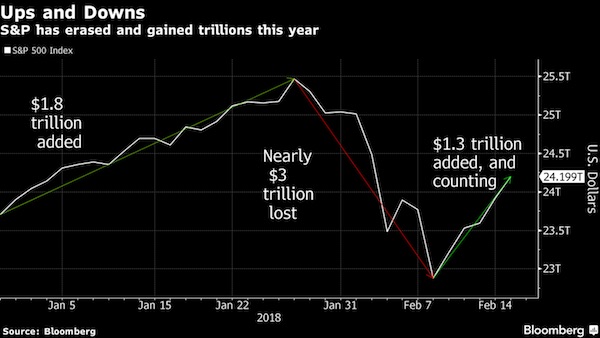

Any and all low financial stress should stress you out. Because there should be a balance between greed and fear. Because stability breeds instability.
• Why Today’s Low Financial Stress Should Stress You Out (Colombo)
In this piece, I will discuss a little-followed, but valuable market indicator called the “St. Louis Fed Financial Stress Index.” According to the St. Louis Fed, this indicator was created in 2010 after economists sought a better way to track U.S. financial system stress in the wake of the 2008 financial crisis. This index uses 18 weekly data series: seven interest rate series, six yield spreads and five other indicators (mostly sentiment-related indicators). When the index is very high (such as in 2008), it means that the U.S. financial system is experiencing a great amount of stress. When the index is low (such as during an economic expansion and bull market), it means that the financial system is experiencing a low amount of stress. According to the chart below, U.S. financial system stress is currently at record lows:
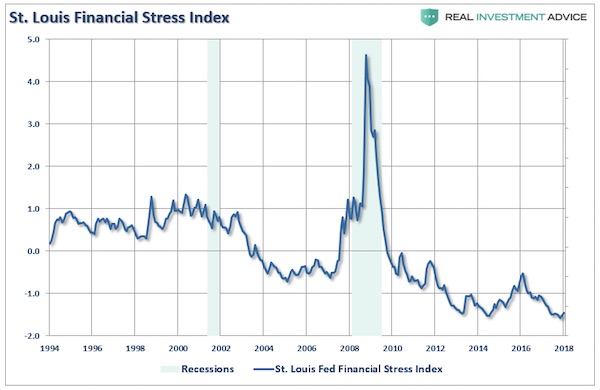
According to the chart below (with my comments added in red), dangerous economic bubbles form during relative troughs in the St. Louis Fed Financial Stress Index. The late-1990s Dot-com bubble formed when the index was at a relative low, as did the mid-2000s U.S. housing and credit bubble, and I believe that the “Everything Bubble” is forming during the current trough. The “Everything Bubble” is a bubble that is inflating in numerous global assets and sectors (including tech startups, U.S. equities, global bonds, some segments of the U.S. property market, property in China, emerging markets, Australia, Canada, and more) as a result of unprecedented central bank stimulus since the global financial crisis.
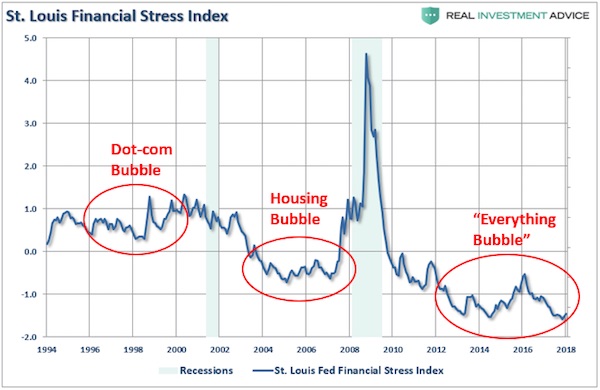
The U.S. Federal Reserve has manipulated interest rates by keeping them extremely low, which has led to the inflation of bubbles throughout the economy. As the chart below shows, bubbles form during periods of low interest rates. In this case, “low” is all relative because interest rates have been trending lower since the early-1980s, which is why asset and credit bubbles are becoming more extreme than in the past. Most people are unaware of how extreme our current bubble is, but it will certainly be another case of “only when the tide goes out do you discover who’s been swimming naked” (to quote Warren Buffett).
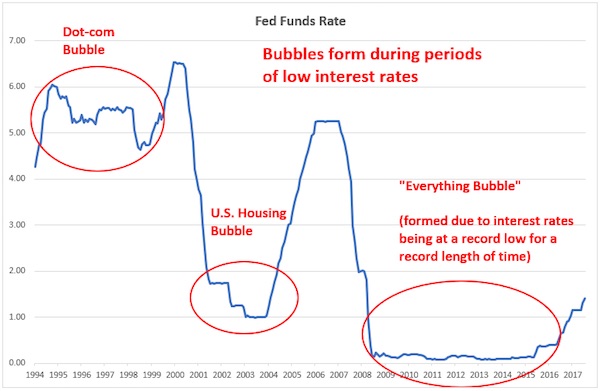

Not much need right now.
• US Government Is Nowhere Close To Regulating Bitcoin (CNBC)
There’s a long way to go before the U.S. government starts regulating bitcoin, Rob Joyce, special assistant to the president and White House cybersecurity coordinator, told CNBC on Friday. Speaking at the Munich Security Conference in Germany, Joyce emphasized the need to better understand the cryptocurrency’s risks and benefits before embarking on any sort of regulatory regime. “I think we’re still absolutely studying and understanding what the good ideas and bad ideas in that space are,” he said when asked about the potential for government regulation. “So, I don’t think it’s close.” Bitcoin is a decentralized cryptocurrency, meaning that unlike fiat currencies such as the dollar, it’s not backed by a central authority. Critics have said that this gives the currency, which saw huge price gains in 2017, no inherent value.
As transactions are completely anonymous, bitcoin has been accused of making it easier for those engaged in illicit activities to hide their money. “We are worried. There are benefits to the bitcoin concept — digital cash, digital currencies,” Joyce said. “But at the same time, if you look at the way bitcoin works after there is a criminal act that takes place, you can’t rewind the clock and take back that currency.” Joyce described the inherent problem with this lack of a trail, noting that in the case of credit card theft, for instance, individuals or companies can contact their banks and purchases can be undone and the cash retrieved. “With the current instantiation of bitcoin and other cryptocurrencies, we haven’t figured that out yet. So it’s a problem,” he said.

Someone comes up with some arbitrary set of numbers (Paris) and expects banks to comply. We got nothing.
• Banks Told They’re Lagging On Response To Climate Change Risks (BBG)
Fewer than half the world’s biggest banks are doing enough to forestall climate change that poses risks to their markets and economies. Most lenders still aren’t producing firm targets for low-carbon financial products that will aid efforts to keep temperatures from rising, according to a survey of 59 banks conducted by Boston Common Asset Management. Even the strongest banks in the survey, including Goldman Sachs, still struggle to define a climate strategy at the heart of their business, according to the report published Thursday and backed by more than 100 institutional investors. Scientists predict higher frequencies of floods, famines and superstorms unless the world keeps temperature rises well below 2 degrees Celsius (3.6 degrees Fahrenheit) this century.
Goldman Sachs was cited as a leader in the report after the investment bank set a 2025 target of $150 billion in clean energy financing and investing. It also released a clean energy impact report in 2016 that examined the impact of the $41 billion in green investments. Almost half of the groups have put in place climate risk assessments and 61% haven’t restricted the financing of coal. The global banking sector provided $600 billion in financing for the top 120 coal plant developers between 2014 and September 2017, according to the report. Boston Common called for all banks to disclose climate risk in line with the Taskforce on Climate-related Financial Disclosures. They should also set clear targets to promote low carbon products and publish strategy reports aligned with the Paris Agreement, according to the recommendations.
“Since 2005, when Goldman Sachs established its Environmental Policy Framework, harnessing market-based solutions to address environmental challenges has become increasingly core to our business,” said Kyung-Ah Park, head of the Environmental Markets Group at Goldman Sachs. “Our $150 billion target of financing and investing in companies that promote clean technology and renewable energy is an example of our commitment to addressing climate change.”

Because the state cannot be made a defendant in court.
• Monsanto Loses Bid To Stop Arkansas Ban On Weed Killer Dicamba (R.)
An Arkansas judge on Friday dismissed a Monsanto lawsuit aiming to stop Arkansas from blocking the use of a controversial farm chemical the company makes, dealing a blow to its attempts to increase sales of genetically engineered seeds. Monsanto, which is being acquired by Bayer, filed the lawsuit last year in a bid to halt the state’s ban on sprayings of the weed killer known as dicamba from the period spanning April 16 to Oct. 31. Growers across the U.S. farm belt said last summer that dicamba drifted away from where it was sprayed, damaging millions of acres of crops that could not tolerate the herbicides. St. Louis-based Monsanto, the biggest U.S. seed company, said it was disappointed with the judge’s decision and would consider additional legal action.
In the ruling, Pulaski County Circuit Court Judge Chris Piazza cited a recent Arkansas Supreme Court decision that the state cannot be made a defendant in court, according to the Arkansas Agriculture Department. Dicamba, also sold by BASF and DowDuPont, is meant to be used during the summer growing season on soybeans and cotton that Monsanto engineered to resist the chemical. Monsanto is banking on the herbicide and its dicamba-resistant soybean seeds to dominate soybean production in the United States, the world’s second-largest exporter. The company says dicamba, which it sells under the name XtendiMax with VaporGrip, is safe when used properly.
The Arkansas ban hurts Monsanto’s ability to sell dicamba-tolerant seed in the state and has caused “irreparable harm” to the company, according to Monsanto’s lawsuit. The state also limited use of Monsanto’s dicamba herbicide in 2017 but allowed sales of products by other companies. David Wildy, an Arkansas farmer who served on a state task force that recommended the ban, said he supported Friday’s ruling. He said his soybeans suffered damage from the herbicide last year and that it threatens plants ranging from flowers to vegetables and peanuts when it drifts away from where it is sprayed. “If we can’t keep products on target, then there’s not a place for them in agriculture,” Wildy said in an telephone interview.

If all the money and energy spent on Mars attacks were used to ameliorate life on earth, perhaps we’d have a shot.
• Yet Another Year of Magical Thinking (Jim Kunstler)
There’s absolutely nothing that might make Mars a “sustainable” habitat for human beings, or probably any other form of Earthly life. The journey alone would destroy human bodies. If you think that living in Honolulu is expensive, with most daily needs of the population shipped or flown in, imagine what it would be like sending a cargo of provisions (Doritos? Pepperoni sticks? Mountain Dew? Fabreeze?) to a million “consumers” up on Mars. Or do you suppose the colonists will “print” their food, water, and other necessities? Elon Musk’s ventures have reportedly vacuumed in around $5 billion in federal subsidies. Mr. Musk is doing a fine job of keeping his benefactors entertained. Americans are still avid for adventures in space, where just about every other movie takes place.
I suppose it’s because they take us away from the awful conundrums of making a go of it here on Earth, a planet that humans were exquisitely evolved for (or designed for, if you will), and which we are in the process of rendering uninhabitable for ourselves and lots of other creatures. This is our home. Can we talk about the necessary adjustments and arrangements we have to make in order to continue the human project here? Just based on our performance on this blue planet, we are not qualified to infect other parts of the solar system.

German politics is descending into chaos.
• The End Of Germany’s Big-Tent Parties (Spiegel)
The country is slipping into a crisis and Germany, the bastion of stability in Europe, is becoming politically unstable. And every month the country continues to be run by a provisional government is another month that Germany doesn’t have a voice in Europe or the world.This is by no means purely a domestic development. The party system is currently being turn upside down across Western democracies. Owing to Germany’s prosperity and the sedative power of its chancellor, it long appeared that Merkel had been spared by the international development. But the torturous wrangling to create a new government has now dashed that hope.
In France, the two parties that once dominated the country now hold only just over a quarter of the seats in the national parliament. In Italy, the Five Star Movement, which doesn’t seem to stand for much other than the desire for change and its loathing of the status quo and is led by a former TV comedian, appears to have strong chances of winning the election there in March. In Germany, the old establishment parties are also struggling to maintain political stability. Combined support for the SPD and the conservatives has dropped from over 90% at the beginning of the 1970s to just 49% today. Their decline, which had previously been a slow and creeping process, has rapidly accelerated in recent months.
The party system in Germany is splintering, with seven parties now represented in national parliament. When it is no longer possible to form governments with two or three parties, it will necessarily become increasingly difficult to build stable governments. Italy already provides an example of what that can mean. The country is constantly swapping out its prime minister and holding snap elections. Italy has had almost 30 prime ministers and a total of 61 cabinets since 1946. In the same period, Germany has been governed by eight chancellors.

Echo chambers just keep getting louder. Not much of substance. So why not RT’s comment? The Russians did it anyway.
• ‘Absurd’ Meddling Claims & Indictment Of Russians Show New US Policy (RT)
US indictment of 13 Russian nationals and three entities over alleged meddling in American elections in 2016 has been labelled absurd by the Russian Foreign Ministry spokesperson, Maria Zakharova. “Turns out, there’ve been 13 people, in the opinion of the US Justice Department. 13 people interfered in the US elections? 13 against billions budgets of special agencies? Against intelligence and counterespionage, against the newest technologies? Absurd? – Yes.” Zakharova said in a Facebook post. The indictment, however, is the “modern American political reality,” Zakharova added, jokingly suggesting that the number 13 was picked due to its negative associations.
One of the indicted, Russian businessman Evgeny Prigozhin, said he was not really upset by the accusations. “The Americans are very emotional people, they see what they want to see. I have great respect for them. I am not at all upset that I am on this list. If they want to see the devil, let them,” Prigozhin told RIA Novosti. The entities and individuals were indicted by a US federal grand jury on Friday of “supporting the presidential campaign of then-candidate Donald J. Trump…and disparaging Hillary Clinton.” However, there are “no allegations” that the suspected activities of the Russian nationals somehow affected the polls, according to the US Deputy Attorney General Rod Rosenstein.
On Friday, Russian Foreign Minister Sergey Lavrov said that supporting Donald Trump has never been an official Russian policy, even if some Russians did express their backing of the new US leader. The Minister has expressed his discontent with the apparently continuing nosedive in the US-Russia relations. “It’s a pity that under Donald Trump, for more than a year of his presidency, our relations have not improved compared to the period of the Democratic administration. Even worsened to a certain extent,” Lavrov told Euronews.

Close it down. It can’t be saved. You can’t send Oxfam people anywhere in the world anymore.
• Oxfam Told Of Aid Workers Raping Children In Haiti A Decade Ago (Ind.)
Aid agencies including Oxfam were warned that aid workers were sexually abusing children in Haiti a decade ago, The Independent can reveal. Children as young as six were being coerced into sex in exchange for food and necessities, according to a damning report by Save the Children, which called for urgent action including the creation of a global watchdog. Its research exposed abuse linked to 23 humanitarian, peacekeeping and security organisations operating in Haiti, Ivory Coast and what was then Southern Sudan. “Our own fieldwork suggests that the scale of abuse is significant,” the report concluded. “Every agency is at risk from this problem … existing efforts to keep children safe from sexual exploitation and abuse are inadequate.”
It identified “every kind of child sexual abuse and exploitation imaginable”, including rape, prostitution, pornography, sexual slavery, assaults and trafficking. One 15-year-old girl in Haiti told how “humanitarian men” exposed themselves and offered her the equivalent of £2 to perform a sex act. “The men call to me in the streets and they ask me to go with them,” said another Haitian girl. “They do this will all of us young girls.” A six-year-old girl described being sexually assaulted and a homeless girl was given a single US dollar by a “man who works for an NGO” before being raped and severely injured, while boys were also reportedly raped. When asked why the abuse was not reported, children said they feared losing aid, did not trust local authorities, did not know who to go to, felt powerless or feared stigma and retaliation. “The people who are raping us and the people in the office are the same people,” said one girl in Haiti.

See? Oxfam is the victim, not te raped children. That this guy still has a job there says more than enough.
• Oxfam Boss: ‘Anything We Say Is Being Manipulated. We’ve Been Savaged’ (G.)
Oxfam has been reeling since the Times reported last week that several of the charity’s aid workers – including the country director, Roland van Hauwermeiren, had used prostitutes in Haiti while providing humanitarian work, following the 2011 earthquake. The men involved lost their jobs, but Oxfam is accused of covering up the scandal. Further revelations of sexual abuse in Oxfam shops, some against volunteers as young as 14, have emerged, engulfing the charity in a crisis unprecedented in its 76-year history. Many things have been said about Goldring and Oxfam this week, but the charge that they have failed to grasp the gravity of the situation seems absurd. Yet he came close to cancelling this interview, justifiably fretting that his words would be wilfully twisted to do Oxfam yet more damage. “Anything we say is being manipulated: ‘Oxfam’s still making excuses, still trying to justify itself.’
I went on the Today programme on the first day and tried to explain and it totally failed. All it did was fuel the fire.” Every explanation he’s tried to offer has been branded an excuse “and just failed in the court of public opinion. We’ve been savaged.” Even apologies only make matters worse. “I said on TV: ‘Yes, we could have done some things faster,’ and all of a sudden we’ve got two former ministers calling for my resignation. What I felt really clearly is many people haven’t wanted to listen to explanations.” To try again is a risk Goldring worries he may regret, but no one can doubt the courage it took. He talks to me alone, unchaperoned by press officers, and is unguarded and candid. The impression I form is of someone telling the truth: if Goldring has been guilty of anything, I think it might be naivety about the vulnerability of almost any organisation in the febrile public mood of distrust.



